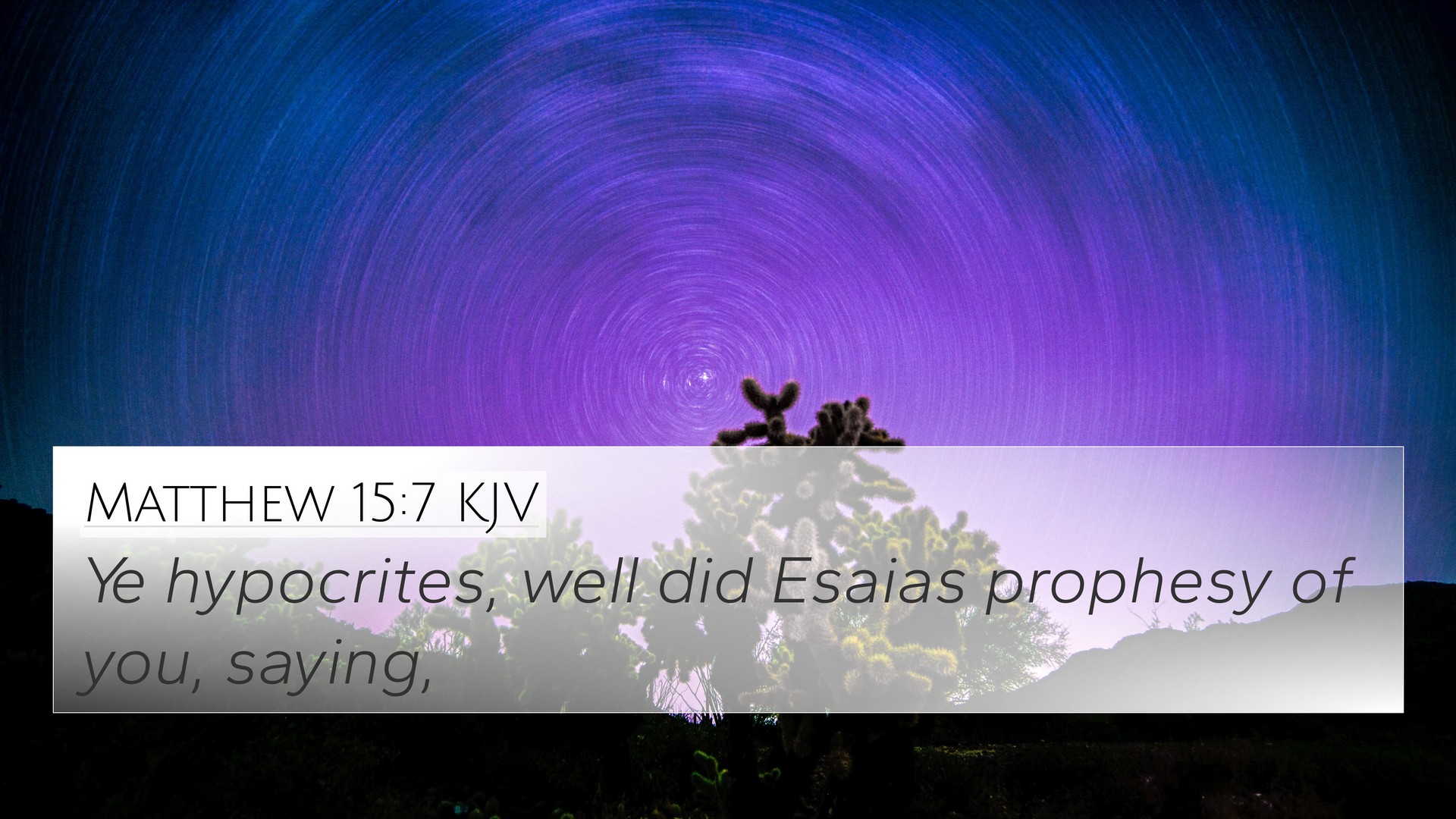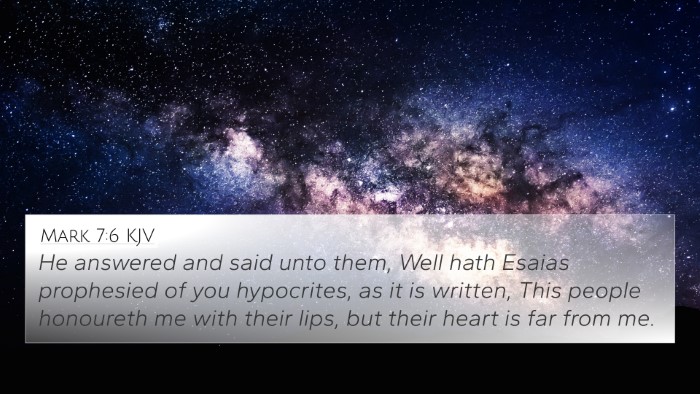Understanding Matthew 15:7
Matthew 15:7 states: "Ye hypocrites, well did Isaiah prophesy of you, saying." This verse serves as a powerful indictment of the religious leaders of Jesus' time, highlighting their hypocrisy. Below is a compilation of insights from notable public domain commentaries, including Matthew Henry, Albert Barnes, and Adam Clarke, aiming to provide a comprehensive interpretation of this scripture.
Commentary Insights
The verse exemplifies Jesus’ rebuke of the Pharisees and Scribes, emphasizing their superficial adherence to tradition while neglecting the heart of true worship and obedience to God. Here’s a deeper look into its meanings:
Historical Context
According to Matthew Henry, this passage arises amid a discourse where Jesus confronts the Pharisees over their traditions that invalidated God’s commandments. The reference to Isaiah suggests that their behavior was a fulfillment of prophetic scripture, positioning their actions as part of a larger narrative about human disobedience to divine instruction.
Adam Clarke notes that the quote from Isaiah shows the prophetic foresight regarding the religious leaders' attitudes. Their worship, devoid of genuine devotion to God, is pointed out as merely an outward show, which speaks volumes to the nature of human piety.
The Nature of Hypocrisy
Albert Barnes elaborates that the term “hypocrites” suggests an actor, someone who plays a part rather than a true worshipper of God. This serves to remind believers that God seeks authenticity rather than mere ritualistic adherence. By quoting Isaiah, Jesus highlights that such behavior has long been recognized as unacceptable in the sight of God.
Henry’s commentary emphasizes that the rebuke serves not only as a historical reflection but also as a present warning to religious leaders and followers alike to examine their hearts and ensure their worship is genuine and rooted in truth.
The Prophetic Fulfillment
This verse is a reminder of the continuity of scripture, and that the words of the prophets remain relevant. Clarke points out that Isaiah's message was directed toward those who honor God with their lips while their hearts are far from Him. This theme echoing through the ages serves as a crucial interpretative lens for understanding not only this specific passage but also the character of God’s dealings with humanity.
Additionally, Barnes mentions that the reference to Isaiah not only condemns the hypocrisy of the contemporaneous leaders but is also indicative of how mankind tends to repeat the same errors throughout biblical history. Thus, believers today are called to reflect on their own practices of faith and strive for sincerity in their worship.
Bible Cross References
This verse creates a wide array of thematic connections throughout scripture. Below are some relevant cross-referenced passages:
- Isaiah 29:13: "Wherefore the Lord said, Forasmuch as this people draw near me with their mouth, and with their lips do honor me, but have removed their heart far from me..."
- Matthew 7:5: "Thou hypocrite, first cast out the beam out of thine own eye; and then shalt thou see clearly to cast out the mote out of thy brother's eye."
- Mark 7:6-7: "He answered and said unto them, Well hath Esaias prophesied of you hypocrites..."
- Luke 6:46: "And why call ye me, Lord, Lord, and do not the things which I say?"
- James 1:26: "If any man among you seem to be religious, and bridleth not his tongue, but deceiveth his own heart, this man's religion is vain."
- Jeremiah 29:13: "And ye shall seek me, and find me, when ye shall search for me with all your heart."
- 1 Samuel 16:7: "But the Lord said unto Samuel, Look not on his countenance, or on the height of his stature; because I have refused him: for the Lord seeth not as man seeth; for man looketh on the outward appearance, but the Lord looketh on the heart."
Connecting the Dots: Cross-Referencing Biblical Texts
This verse invites readers to engage in a comparative Bible verse analysis, linking it to other scriptures that address themes of authenticity, sincerity in worship, and the caution against hypocrisy. Here are some guidelines and tools for developing a deeper understanding:
- How to Find Cross-References in the Bible: Utilize a Bible concordance to trace themes and significant terms that connect various passages.
- Bible Cross-Reference Guide: Compiling a guide of parallels allows for thorough exploration of similar themes.
- Cross-Referencing Bible Study: Engaging in study methods that highlight the cross-connections can enhance understanding of the overall biblical narrative.
- Identifying Connections Between Old and New Testament: Recognizing how New Testament teachings fulfill and echo Old Testament prophecies can illuminate meaning.
- Bible Cross-References for Sermon Preparation: Preachers can benefit from using these cross-references to support their messages.
Conclusion
Matthew 15:7 serves as a crucial reminder that God desires a heart that is genuinely inclined toward Him. The insights provided by the commentators shed light on the perils of hypocrisy and the importance of true worship. Through examining related scriptures, believers can cultivate a more profound and sincere relationship with God, free from the trappings of mere outward appearances.






